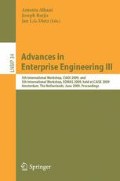Abstract
This paper describes the results of a case study conducted at the Port of Rotterdam, the largest port in Europe. The goal of the case study is to evaluate our Enterprise Ontology-based service specification framework for its use in component-based software development projects. During a Rational Unified Process (RUP)-project at the Port of Rotterdam we specified the required services for the first iterations using this framework. The framework contributed to early error discovery and awareness of important, but often overlooked, service aspects. Overall the service specification framework fulfilled the needs of the project, though some findings led to improvements in our framework.
Access this chapter
Tax calculation will be finalised at checkout
Purchases are for personal use only
Preview
Unable to display preview. Download preview PDF.
References
Ackermann, J., et al.: Standardized specification of business components (February 2002), http://www.wi2.info/downloads/gi-files/MEMO/Memorandum-english-final-included.pdf
Akram, A., Allan, R., Meredith, D.: Best practices in web service style, data binding and validation for use in data-centric scientific applications. In: Proceedings of the UK e-Science All Hands Meeting, Nottingham, UK (September 2006) Imperial College of London
Albani, A., Dietz, J.L.G.: The benefit of enterprise ontology in identifying business components. In: Proceedings of WCC, Santiago de Chile, Chile (2006)
Booch, G.: Object-Oriented Analysis and Design with Applications, 2nd edn., Benjamin–Cummings, Redwood City, California, USA (1994)
Clements, P., et al.: Documenting Software Architectures. Pearson, London (2002)
Dietz, J.L.G.: Enterprise Ontology, Theory and Methodology. Springer, Heidelberg (2006)
Erl, T., et al.: Web Service Contract Design and Versioning for Soa. Prentice Hall PTR, Upper Saddle River (2008)
Flores, F., Ludlow, J.: Doing and speaking in the office. Decision Support Systems, Issues and Challenges, 95–118 (1980)
Goldkuhl, G., Lyytinen, K.: A language action view of information systems. In: Proceedings of the ICIS, Ann Arbor, MI, USA, pp. 13–29 (1982)
Habermas, J.: Theorie des kommunikativen Handelns. Suhrkamp Verlag, Frankfurt am Main (1981)
Hevner, A.R., March, S.T.: The information systems research cycle. Computer 36(11), 111–113 (2003)
Hevner, A.R., March, S.T., Park, J., Ram, S.: Design science in information systems research. MIS Quarterly 28(1), 75–105 (2004)
Jacobson, I.: Object-Oriented Software Engineering: a Use Case driven Approach. Addison-Wesley, Wokingham (1995)
Levi, K., Arsanjani, A.: A goal-driven approach to enterprise component identification and specification. Communications of the ACM 45(10), 45–52 (2002)
McGovern, J., Sims, O., Jain, A., Little, M.: Enterprise Service Oriented Architectures. Springer, New York (2006)
Parnas, D.L.: On the criteria to be used in decomposing systems into modules. Communications of the ACM 15(12), 1053–1058 (1972)
Peffers, K., et al.: A design science research methodology for information systems research. Journal of Management Information Systems 24(3), 45–77 (2007)
Rumbaugh, J., et al.: Object-oriented modeling and design. Prentice-Hall, Inc., Upper Saddle River (1991)
Stake, R.E.: The art of case study research. Sage Publications, Thousand Oaks (1995)
van Aken, J.E.: Management Research Based on the Paradigm of the Design Sciences: The Quest for Field-Tested and Grounded Technological Rules. Journal of Management Studies 41(2), 219–246 (2004)
van Strien, P.J.: Towards a methodology of psychological practice: The regulative cycle. Theory Psychology 7(5), 683–700 (1997)
van Zeist, B., Hendriks, P.: Specifying software quality with the extended ISO model. Software Quality Journal 5(4), 273–284 (1996)
Yin, R.K.: Case Study Research: Design and Methods, 3rd edn. SAGE Publications, Thousand Oaks (2002)
Zhang, Z., Liu, R., Yang, H.: Service identification and packaging in service oriented reengineering. In: Proceedings of the SEKE, pp. 241–249 (2005)
Author information
Authors and Affiliations
Editor information
Editors and Affiliations
Rights and permissions
Copyright information
© 2009 Springer-Verlag Berlin Heidelberg
About this paper
Cite this paper
Terlouw, L., Eveleens Maarse, K. (2009). A Service Specification Framework for Developing Component-Based Software: A Case Study at the Port of Rotterdam. In: Albani, A., Barjis, J., Dietz, J.L.G. (eds) Advances in Enterprise Engineering III. CIAO! EOMAS 2009 2009. Lecture Notes in Business Information Processing, vol 34. Springer, Berlin, Heidelberg. https://doi.org/10.1007/978-3-642-01915-9_8
Download citation
DOI: https://doi.org/10.1007/978-3-642-01915-9_8
Publisher Name: Springer, Berlin, Heidelberg
Print ISBN: 978-3-642-01914-2
Online ISBN: 978-3-642-01915-9
eBook Packages: Computer ScienceComputer Science (R0)

